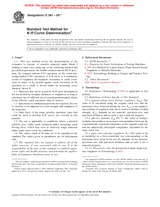We need your consent to use the individual data so that you can see information about your interests, among other things. Click "OK" to give your consent.
ASTM E561-05e1
Standard Test Method forK-R Curve Determination (Includes all amendments And changes 12/31/2010).
Automatically translated name:
Standard Test Method forK-R Curve Determination
STANDARD published on 1.6.2005
The information about the standard:
Designation standards: ASTM E561-05e1
Note: WITHDRAWN
Publication date standards: 1.6.2005
SKU: NS-47204
The number of pages: 19
Approximate weight : 57 g (0.13 lbs)
Country: American technical standard
Category: Technical standards ASTM
Annotation of standard text ASTM E561-05e1 :
Keywords:
effective crack extension, fracture mechanics, fracture resistance, fracture toughness, KR , K-R curve, linear elastic, plane stress, plastic zone, standard test method, stress intensity factor, ICS Number Code 77.040.10 (Mechanical testing of metals)
Additional information
| 1. Scope | ||||||||
|
1.1 This test method covers the determination of the resistance to fracture of metallic materials under Mode I loading at static rates using any of the following notched and precracked specimens: the middle-cracked tension M(T) specimen, the compact tension C(T) specimen, or the crack-line-wedge-loaded C(W) specimen. A K-R curve is a continuous record of toughness development (resistance to crack extension) in terms of KR plotted against crack extension in the specimen as a crack is driven under an increasing stress intensity factor, K. 1.2 Materials that can be tested for K-R curve development are not limited by strength, thickness, or toughness, so long as specimens are of sufficient size to remain predominantly elastic to the effective crack extension value of interest. 1.3 Specimens of standard proportions are required, but size is variable, to be adjusted for yield strength and toughness of the materials. 1.4 Only three of the many possible specimen types that could be used to develop K-R curves are covered in this method. 1.5 The test is applicable to conditions where a material exhibits slow, stable crack extension under increasing crack driving force, which may exist in relatively tough materials under plane stress crack tip conditions. 1.6 The values stated in SI units are to be regarded as the standard. The values given in parentheses are for information only. 1.7 This standard does not purport to address all of the safety concerns, if any, associated with its use. It is the responsibility of the user of this standard to establish appropriate safety and health practices and determine the applicability of regulatory limitations prior to use. |
||||||||
| 2. Referenced Documents | ||||||||
|
We recommend:
Technical standards updating
Do you want to make sure you use only the valid technical standards?
We can offer you a solution which will provide you a monthly overview concerning the updating of standards which you use.
Would you like to know more? Look at this page.




 Cookies
Cookies
